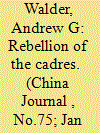| Srl | Item |
| 1 |
ID:
183137


|
|
|
|
|
| Summary/Abstract |
The consciousness of non-Han nationalities in modern China evolved around a deep antipathy to the Qing, assimilationist ideas, and pretentious multi-ethnicism. The concepts of equality among nationalities and right to self-determination entered into the discourse of nation- and state-building in China under the influence of Lenin’s revolutionary ideals and Stalin’s views on ‘the national question’. The Communist Party of China (CPC) has struggled to reconcile these concepts with its nationalist agenda since its inception in 1921. The CPC later innovated ethno-regional autonomy for minorities and developed corresponding institutions. This article argues that the Party’s three main agendas of national unification and interethnic unity, developmental goals, and majoritarian nationalism have all complicated its ties with ethnic minorities, and evaluates how the present leadership of the 100-year-old Party has been managing the relationship.
|
|
|
|
|
|
|
|
|
|
|
|
|
|
|
|
| 2 |
ID:
145249


|
|
|
|
|
| Summary/Abstract |
Accounts of the tumultuous initial phase of the Cultural Revolution portray party-state cadres primarily as targets of a popular insurgency. Cadres in Party and government organs in fact were themselves in widespread rebellion against their superiors after October 1966, and rebel cadres were a major force in the national wave of power seizures that destroyed the civilian state in early 1967. The rebellion was a form of bureaucratic politics in a setting characterized by rapidly shifting signals and high uncertainty, in which the rebels’ motives were generated after the onset of the Cultural Revolution. Cadres played a central role in the destruction of the political institutions to which their vested interests were inextricably linked.
|
|
|
|
|
|
|
|
|
|
|
|
|
|
|
|
| 3 |
ID:
148075


|
|
|
|
|
| Summary/Abstract |
Some observers are drawing parallels between governing the Catholic Church and governing the party-state in China. Analogy can be illuminating, but it also can obscure or mislead. This article contends that there are three quintessential similarities between the two polities. Both are permeated perennially by agency problems. Each is a self-claimed “virtuocracy.” And both hold aloft distributive justice, a mission that, if overlooked, would undermine the polities’ raisons d’être. This essay also contends that the two polities differ in three fundamental aspects. Seemingly functioning beyond a legal framework, the clerics and others who broadly implement the policies of the Catholic Church actually are as subject to the law as anybody in a liberal democracy, unlike the leaders of the party-state in China. Second, the party-state in China is more obsessed with blame avoidance than claiming credit, while the reverse is true for the Holy See. Finally, and paradoxically, the party-state in China is far less ideologically constrained than the Vatican. These comparisons and contrasts between the two polities help to shed light on the intrinsic nature of each regime.
|
|
|
|
|
|
|
|
|
|
|
|
|
|
|
|